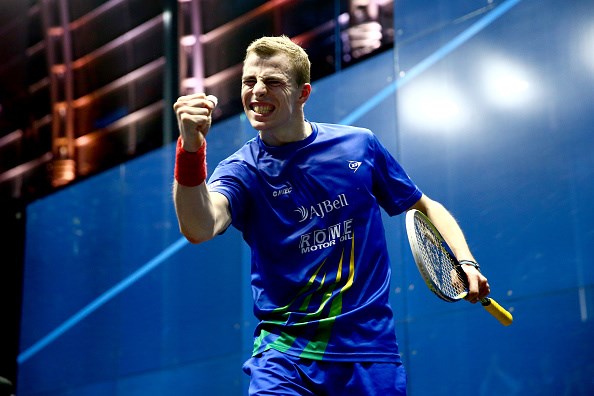Nick Matthew (credit: Jordan Mansfield/Getty Images)
Squash has campaigned for its inclusion in the Olympic Games since Barcelona 1992 and, despite being one of the most popular sports in the world, with over 20 million people playing worldwide, it continues to be overlooked by the IOC (International Olympic Committee). But why?
The sport will apply for the eighth time in a row to be part of the world’s most prestigious sporting competition, along with 25 other sports, including other favourites baseball-softball and netball, and some more hopeful applicants, such as bridge, chess and tug-of-war, the latter last involved in the Games in 1920. With such a following in so many countries and such weak competition, it is a surprise to all involved in the sport and many others that squash has not been included yet.
It is widely acknowledged that for a sport to be included in the competition, winning an Olympic gold medal should be the pinnacle of an athlete’s career. Yet, every year, when plausible, popular sports are recommended to be added to the Games, another sport with more of an international profile is undeservedly added in their place.
Mohamed El Shorbagy (R) (Photo by AFIF ABD HALIM/AFP/Getty Images)
This was particularly apparent in the inclusion of golf as a stroke play tournament in the 2016 Olympics, which will be held in Rio de Janeiro. Although golf has an extensive global appeal and allows a large number of countries to stake their claim for a medal, the tournament will never be regarded by the sport’s fans in the same way as the four “majors” are. There are numerous other sports, on the other hand, with squash one of the most high profile, in which the Olympics would in fact be the tournament that players train hardest for and which would be the peak of any player’s career. It is, however, still usurped by less deserving or less popular sports.
Moreover, 26 countries are represented in the top 50 players in men’s and women’s squash and there are squash courts in 188 countries and territories around the world, so it cannot be accused of lacking global support and being included purely to improve the chances of a few countries. This should give it an advantage over a few of the other most likely sports to be considered, such as baseball and American football, as it will never be a foregone conclusion as to which countries will walk away with medals. This is particularly true in the men’s game, where 5 of the top 6 players in the world come from different countries.
Amr Shabana of Egypt i(Photo by Paul Gilham/Getty Images)
Squash also gives an opportunity for smaller countries, who would not usually win so many medals during the course of an Olympic Games to move themselves up the medal table, as none of China, USA, Russia and, to an extent, Australia are known for their squash prowess. Rather it would be countries such as Egypt, UK, Colombia, France and Malaysia competing for the medal places.
On the other hand, as with any sport, there are some concerns about its suitability for inclusion, the primary being its capacity as a spectator sport. Unfortunately, squash has been unable to find a sufficient solution to this problem thus far. Due to the speed of play and the complexity of some of the rules, particularly about interruptions in play – i.e. lets (where the point is replayed) and strokes (where the point is awarded to the player who is impeded) – those who have limited knowledge can often find the sport confusing to watch and therefore boring. There have, however, been significant changes, particularly for TV, to make the game much more understandable for viewers. For example, the ball is now white, rather than black, to make it more visible onscreen, and video replays and video referees have been introduced to make each decision clearer to the audience and to eliminate referee error. If squash continues to find ways to make squash more watchable to the untrained eye, then it could well remove one of its greatest obstacles in its fight for IOC recognition.
There is also a common belief among the global population, particularly in younger people, that squash is merely a sport for the older generation. The current squash community, however, would very much beg to differ. As in many sports, as each generation begins its decline, a new one comes to take its place.
Nick Matthew (Photo by Jordan Mansfield/Getty Images)
In the world of professional squash for instance, players who have dominated for the last five years, such as Amr Shabana and, to a lesser extent, Nick Matthew and Gregory Gaultier are beginning to fade, but the sport has been reinvigorated by the emergence of players such as current world number one Mohamed El Shorbagy, who will be followed closely in the next few years by rising talents like his brother Marwan, Fares Dessouki and Diego Elias. Furthermore, even in local leagues, the top end of club squash is increasingly becoming a younger man’s game, as squash continues to become one of the world’s most popular sports.
Despite any arguments thrown at the IOC every 4 years by those fighting for squash’s inclusion, however, it seems almost inevitable that squash will again miss out on a seat at sport’s highest table. For now, it must be content to be the best of the rest, the sport that never quite caught the world’s interest.

Leigh is, without a doubt, the most over worked writer here at Crunch Sports. A statistician at heart, she can reel off Superbowl plays from decades ago. If we need a deep-dive into the numbers in any sport, we call Leigh first.









